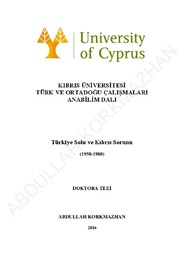Türkiye Solu ve Kıbrıs Sorunu (1950-1980)

Date
2014-05Author
Korkmazhan, AbdullahAdvisor
Kizilyurek, NiyaziPublisher
Πανεπιστήμιο Κύπρου, Σχολή Ανθρωπιστικών Επιστημών / University of Cyprus, Faculty of HumanitiesPlace of publication
ΚύπροςGoogle Scholar check
Keyword(s):
Metadata
Show full item recordAbstract
This study analyses and questions the left movements in Turkey from the 1950’s to the 1980’s and their policy and approaches to the Cyprus Problem and its sub headings which were able to maintain their agenda in internal and foreign policy in Turkey and their relations with Kemalism and nationalism in regard to the Cyprus problem.
The first part of the study which is composed of five parts covers the period between the 1950’s where the Cyprus Problem was considered as Turkey’s ‘National Problem’, to the 26th of May 1960 where the military coup took place in Turkey. The second part covers the period referred to as the post-coup era where the 1961 Constitution guarantees fundamental rights and freedoms and thus provides a relatively libertarian environment where the left develops and strengthens up to the military coup of the 12th of March 1971. Post 12th of March up until the military coup of the 12th of September 1980 composes the third part of the study.
Whereas the first three sections of the study are document and archive analysis based, the fourth section of the study is allocated to question and answer method interviews that take place between figures that lead the left movements in Turkey and intellectuals who offer important contributions on Turkey’s left. In the fifth and final part of the study, a political and ideological argument develops on the left movement in Turkey and their relationship and interaction with Kemalism and nationalism is explained. Finally the conclusions and main suggestions of the study are outlined.
The main method applied during the study is the analysis of primary resources and archives. In addition publications that applied a holistic approach to the historical, theoretical and practical aspects of Turkey’s left were benefited from and qualified interviews took place.
It is not possible to state that Turkey’s left approached the Cyprus Problem from a classist perspective in a consistent and distinctive manner that served the common interest of the two communities. As it was for those in power, Cyprus was also a national case for the left. A strong sense of nationalism prevails in the approach of the left to the Cyprus Problem. A distinction was not made between anti-imperialism and nationalism. The true reason that lies beyond this is the structural nationalist problem of the left and its lack of ideological independence from Kemalism and the official ideology. Bu çalışmada, Türkiye sol hareketlerinin 1950’lerden itibaren 1980’e kadar Türkiye’de iç ve dış politikanın gündemindeki yerini koruyan Kıbrıs sorunu ve alt başlıklarına ilişkin politikaları ve yaklaşımları ile Kıbrıs sorunu bağlamında, Kemalizm ve milliyetçilikle ilişkileri incelenmekte ve sorgulanmaktadır.
Beş bölümden oluşan çalışmanın ilk bölümü, Kıbrıs sorununun Türkiye’nin “Milli bir sorunu” haline getirildiği 1950’lerden, 26 Mayıs 1960’da Türkiye’de gerçekleşen askeri darbeye kadar olan dönemi kapsamaktadır. İkinci bölümde, darbe sonrası kabul edilen 1961 Anayasası’nın temel hak ve özgürlükler alanında sağladığı görece özgürlükçü bir ortamda solun gelişip güçlendiği ve 12 Mart 1971 askeri darbesi ile son bulan dönem incelenmektedir. 12 Mart sonrası ve 12 Eylül 1980 askeri darbesine kadar olan dönem ise çalışmanın üçüncü bölümünü oluşturmaktadır.
İlk üç bölümü belge ve arşive dayalı inceleme olan çalışmanın dördüncü bölümünde, Türkiye sol hareketlerinin önde gelen bazı kişileri ve sol üzerine önemli çalışmaları bulunan aydınlarla, soru cevap yöntemi ile gerçekleştirilen röportajlara yer verilmektedir. Beşinci ve son bölümde ise Türkiye sol hareketi üzerine ideolojik ve politik tartışma yürütülmekte, Kemalizm ve milliyetçilik ile olan ilişkisi ve etkileşimi anlatılmaktadır. Son olarak çalışma çerçevesinde varılan sonuçlara ve temel önermelere yer verilmektedir.
Çalışma boyunca izlenen temel yöntem konu ile ilgili birinci kaynakların ve arşivlerin birinci elden incelenmesi olmuştur. Ayrıca Türkiye sol hareketini tarihsel, teorik ve pratik bütünlük içerisinde ele alan yayınlar ve çalışmalardan da yararlanılmış, bunun yanında nitelikli röportajlar yapılmıştır.
Türkiye solunun, Kıbrıs sorununa sınıfsal bir perspektiften ve iki toplumun ortak çıkarları açısından yaklaşımı, çözümlemesi, tutarlı ve özgün bir politikası söz konusu değildir. Kıbrıs, iktidarlar için olduğu gibi sol açısından da milli bir davadır. Solun, Kıbrıs sorununa yaklaşımına derin bir ulusçuluk hakimdir. Anti-emperyalizm ve milliyetçilik ayırımı yapılamamıştır. Tüm bunların ardında yatan esas neden, soldaki yapısal milliyetçilik sorunu ve Kemalizm ile resmi ideolojiden bağımsızlığını kazanamamış olmasıdır.
